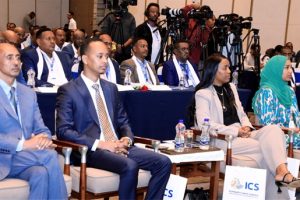
On Tuesday, Ethiopia has marked the first anniversary of the coming to office of Prime Minister Dr. Abiy Ahmed. Over the past year, the Premier’s administration has been undertaking an overall reform that takes many commentators and observers by surprise.
Clearly, in his reform initiatives, the Prime Minister has given due emphasis to ensuring political freedom to Ethiopians and smooth transition to democracy. But, from time to time, he has also given indications about his plans to stimulate economic recovery as the country felt the effects of the three years protests that led to his coming to power.
During his speech on Tuesday at the Millenium Hall, Dr. Abiy went through his one year in office, and what is expected of his administration and every Ethiopian in the coming year. And of course, as expected, his speech has also focused on the economy. During the past year, Dr. Abiy’s administration has been busy by extensively engaging in economic diplomacy.
In his speech, the Premier underlined this fact. Ethiopia has been able to secure 13 billion USD from investment loan, aid, remittance, and export over the last seven months, he said. Indicating that he has received the country with an empty treasury, within a short period, his government has been able to fund eight billion USD to the private sector in order to resolve the huge hindrance the sector used to face in relation to import and export business.
In this regard, no one can deny the fact that Abiy has done a remarkable job in terms of economic diplomacy and enabled the country earn billions of USD from its development partners such as the World Bank and the United Arab Emirates. In his speech, the Premier has also given due emphasis to further reinforcing economic recovery as part of his plan for the days to come. Because, if the country is not able to recover its economic progress, it would be difficult to achieve the other goals of the reform.
Unquestionably it is time for the government to focus on the economy. And above all, priority has to be given to unemployment and inflation. These two are pressing economic issues that require the government’s urgent political decision. Particularly, reducing the unemployment rate should be the prime concern of the government because it is among the major factors that greatly contribute to political turmoil.
Various youth participatory projects need to be devised to address unemployment. Ensuring the participation of the youth in all economic sectors such as agriculture, industry, micro, and small enterprises development, and the likes is a must. If this is so, the youth would continue to be a development force.
Further, a strong commitment is required to accomplish the mega projects commenced during GTP I and GTP II. As the shortage of finance may be raised as a great hurdle in executing the national plans, no other option is better than utilizing the limited budget wisely. On the other hand, Ethiopia has done very well in attracting Foreign Direct Investment (FDI) as it among the top five largest FDI destinations in Africa.
Further, the Prime Minister’s administration has also laid out plans to partially privatize key state-owned enterprises, including Ethio-Telecom, Ethiopian Airlines, and Ethiopian Electric Power Corporation. His office is reviewing the ease of doing business index to improve Ethiopia’s investment climate by streamlining regulation, making it easier to start a business and boosting access to finance.
These economic reform initiatives would undoubtedly reinforce economic recovery and bring about efficiency. On the other hand, the Ethiopian private sector has to be expanded and become stronger than ever. The growth has to be led by the domestic private sector.
Thus the government needs to come up with policies, and government incentives that will strengthen the Ethiopian private sector. All in all, what one can understand from the Premier’s commitment to economic reforms is that it has a central place in transforming the country into one of the notable democracies in Africa.
The Ethiopian Herald, April 4/2019





